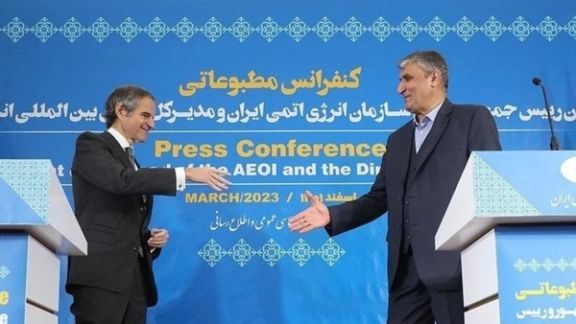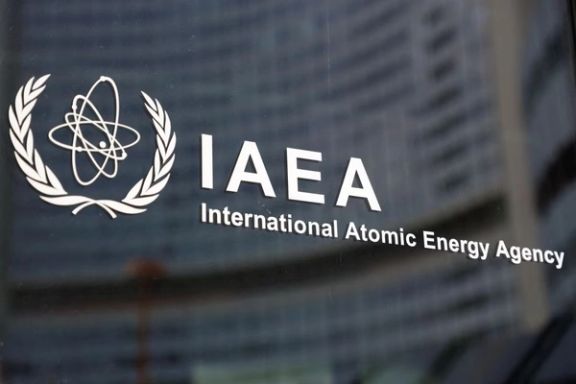Iran Claims Two Nuclear Issues Raised By IAEA Are Resolved

Iranian state media claimed Tuesday that two contentious issues raised by the UN nuclear watchdog, the International Atomic Energy Agency have been resolved.

Iranian state media claimed Tuesday that two contentious issues raised by the UN nuclear watchdog, the International Atomic Energy Agency have been resolved.
The claim, not reported by the Agency or Western media, added that the resolution was the result of IAEA chief Rafael Grossi’s visit to Tehran in March.
Grossi had paid a last-minute visit just before the IAEA board meeting in an apparent move to forestall a resolution condemning Iran’s lack of cooperation with the Agency. He Left Tehran with a paper resembling “peace in our times” claiming that an agreement to speed up cooperation had been reached. Since then, the agency has largely been silent about the results of the promised cooperation.
But Iranian officials have kept claiming progress with the IAEA since March, without any details or confirmation by the Agency.
The Tuesday report about progress came only days after Iran International reported that “the Islamic Republic is expected to show more flexibility on issues related to its nuclear program in exchange for the release of its frozen funds in Iraq, and free hostages with dual nationality in exchange for its assets in South Korea.”

A source had told Iran International last week that talks between Iran and the US on the release of Tehran's frozen assets could result in a deal soon. Earlier in the week, Israel’s state television channel Kan 11 also reported that a deal between Tehran and Washington will be finalized in the coming weeks.
Citing unnamed sources with knowledge of the matter, a report by Mehr news agency close to Tehran’s hardliners said Tuesday that the latest case that has been resolved “through Tehran's goodwill and cooperation” pertained to Abadeh, one of the sites where the IAEA had detected traces of uranium related to Iran’s secret nuclear work more than 20 years ago. The report added that another case regarding traces of uranium particles enriched to 83.7 purity that emerged earlier this year has also been closed, without specifying any details.
Sites not declared as part of Iran’s nuclear program where inspectors had discovered traces of uranium led to a resolution critical of Iran for lack of cooperation by the IAEA board of governors in June 2022.
The resolution called on Iran to engage with the IAEA without delay and expressed “profound concern” at Iran’s failure to satisfy the agency over the traces of uranium. The resolution came with year-long talks to revive the nuclear deal collapsing over Iran’s strenuous demands beyond the original phrases of the accord.
Now with another board of governors’ meeting this month, Tehran may be trying to claim progress, but the prospects seem dim in light of recent revelations about Iran developing a deep underground facility near the Zagros Mountains in central Iran, close to the Natanz nuclear facility, and dedicating hectares of land to increase the security buffer zone for Fordow nuclear plant -- another underground uranium enrichment facility northeast of the city of Qom.
The IAEA is due to issue quarterly reports on Iran this week, ahead of a regular meeting of its 35-nation Board of Governors next week.
The UN watchdog has also kept expressing dissatisfaction with Iran’s response to the Agency’s questions and has not released any report indicating that the regime provided thorough explanations. In its official response regarding the Abadeh site, Iran said last year that the origin of the uranium particles is "unknown" and insisted the site was used for "the exploitation of fireclay through a contract with a foreign company decades ago" hence the IAEA’s “conclusion is absolutely false, unrealistic and biased.”
Back in 2015, the IAEA concluded that Iran had operated an “organizational structure” carrying out “feasibility and scientific studies” in nuclear research before 2003, with some aspects continuing until 2009. When Iran agreed in the 2015 Joint Comprehensive Plan of Action (JCPOA) to drastically limit its nuclear program, the agency’s emphasis shifted towards monitoring its compliance with the agreement reached with the six world powers.
But the pre-2003 work was revived as an issue by further agency investigations after Israel claimed in 2018 to have stolen a trove of documents from Iran, and by Tehran’s expansion after 2019 of its nuclear program beyond JCPOA limits.
Such hypes about an impending agreement in the regime’s media are not unprecedented as Tehran keeps boasting about the IAEA’s confirmation of “the peaceful nature of its nuclear program,” something that has never happened in any report by the UN agency.